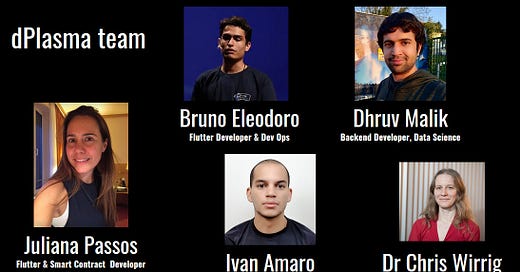This month on Blue Steens
Convalescent plasma chained
Last month I blogged about being a mentor at the Stop Covid-19 hackathon. This month's article explains the team's idea & solution. A winning idea, may I add! 🏆😁 Our international team (Brazil, France, Scotland) tackled the challenge of improving the supply of convalescent plasma using blockchain technology.

Let’s go & play!
Video with loads of insight and motivational advice by Neil deGrasse Tyson (as you’d expect). What absolutely resonated with me was this, “What is an adult scientist but a kid who’s never lost the curiosity.“ - This captures my sentiment precisely. 😄
Beyond Blue Steens
Coronavirus
⊳ Testing
For quick explanations of the difference between PCR and antibody tests, check out March’s & April’s COVID-19 Testing sections.
Kahala Biosciences & Rymedi introduce blockchain-tracked antibody test. Check out Robert Miller’s write-up.
A microfluidic test for viral antibodies has been developed for avian flu but could be adapted for COVID-19. This is an interesting piece of technology. The article doesn’t mention price. Yet, I wonder about the cost-benefit relation, especially for use in a pandemic, given that there is a plethora of possibly cheaper and increasingly accurate COVID-19 antibody kits on the market (May review).
Illumina received emergency use authorisation for its next-generation sequencing-based (NGS) test. NGS is sort of like PCR on steroids. In terms of routine COVID-19 testing, I gather that the main advantage of NGS would be the higher through-put. Thus, it could scale up testing capacities quickly. For lower through-put, PCR seems cheaper.
Accuracy of home swab tests is catching up with swabs performed by healthcare professionals. Besides the advantage of personal protection, it would be a great relief if healthcare staff was freed up for services that have been dropped or reduced during the crisis.
FDA warns against using antibody COVID-19 tests on ‘removed’ list.
⊳ Treatment
(Hydroxy-) Chloroquine:
Huge controversy around genuineness of data used for prestigious publications has led to retractions by Lancet & NEJM. The journals’ quality control & peer-review have clearly failed scientific rigour and readers’ trust. This mess was also part of the reason the WHO had stopped its hydroxychloroquine clinical trial (May review). The trial arm has resumed since.
Other trials have been halted, though, by MHRA & NIH who have seen no additional beneficial effect and by Novartis due to participant shortage.
Remdesivir:
Gilead has been struggling to meet demand in US. Shortages are nothing new to Gilead (March review).
Gilead aiming to release easy-to-use inhaled remdesivir version to enable use outside hospital. Trials starting this summer.
India’s drug regulator has given Hetero Labs and Cipla Ltd permission to manufacture and market generic version of remdesivir.
Passive immunisation:
Neutralising antibodies: These are capable of inactivating the virus (not all antibodies are). Junshi Biosciences’ Phase 1 study has started. Celltrion looking to start clinical trials in July 2020 after successful pre-clinical testing.
SAb Biotherapeutics’ fully human antibodies from genetically modified cows could reduce the need for convalescent plasma collected from patients who have overcome the infection. Clinical trial anticipated this summer.
Immunosuppressants:
Anti-inflammatory drugs dexamethasone & tocilizumab appear to improve disease progression & survival of severely ill patients.
⊳ Vaccination
We distinguish between active and passive immunisation strategies. Active immunisation stimulates our body to mount its own immune response. This is achieved, for example, by administering weakened virus versions. Newer, supposedly safer techniques use DNA (see May review, Cytiva & Takara Bio) or mRNA (below) vaccines. I outlined the passive strategy in the May review.
Whilst running their Phase 2 study (300 participants), Moderna has finalised the Phase 3 protocol following FDA feedback. Controlled US trial to start July 2020 with 30,000 participants. Moderna’s vaccine is interesting, as it uses mRNA. We all have mRNA in our cells, in fact, we need it to live because it’s a crucial part of how our cells function. Moderna’s mRNA tells our body to build virus proteins, which are harmless on their own. Our immune cells will then see these and mount a defence. If we later encounter the actual virus, our immune system will already be prepared.
Sinovac reveals positive preliminary results from phase 1/2 trials.
International supply deals are being prepared, e.g.: AstraZeneca & Vaccines Alliance of Europe, Israel & Moderna
S.Korea's Genexine begins phase 1 trial of DNA vaccine.
Oxford vaccine in Brazil - first country outside UK to start testing.
⊳ Other news
BioCentury has a clinical trial dashboard tracking over 200 ongoing studies.
WHO launched COVID-19 Technology Access Pool (C-TAP) to improve access to medical advances & speed of innovation by facilitating global non-exclusive voluntary licensing schemes. The debate over the need for such a platform is ongoing.
Biotech
Memed received CE mark for test that distinguishes between bacterial and viral infections based on algorithmic analysis of the patient’s immune response. The goal is to reduce the unnecessary use of broad-spectrum antibiotics and, thus, slow the development of antibiotic resistance.
faCellitate originates from a BASF internal business incubator and develops polymer structures for 3D cell cultures for experimental use. They have released their first product BIOFLOAT. 3D cell culture is closer to physiological environments and, hence, supposed to yield more relevant results with the potential to reduce animal testing. [German]
Medtech
Ruma has developed a blockchain-facilitated way of contactless urine sampling. The original motivation stems from the desire to improve the monitoring of drug addicts on substitution therapy. The system tracks the unique code of each marker substance, which patients swallow before sampling, from manufacture to lab-validated patient sample. The system further offers secure communication and patient management with digital identities. [German]
Merantix Healthcare is the first company in Germany to have received the CE mark for AI-enabled cancer screening software intended for early detection & prevention. The AI has been trained on over 2M breast cancer images. [German]
Out and about
3 June: The State of the Blockchain Ecosystem [replay]
4 June: Blockchain isn't for everything [replay]
4 June: EY World Entrepreneur Of The Year™ 2020 [replay]
8 June: Dignity Preserving Healthcare: Privacy by Design [replay], CogX 2020
18 June: Enterprise DLT Live Episode 002 - Heather Flannery, ConsensysHealth [replay]
PHI Readiness Framework graphic (mentioned in the conversation)
18 June: Spherity's Open Office Series, w/Guest Luigi Riva of Swisscom Blockchain
Recent Health Unchained podcast with Spherity CEO Carsten Stöcker:
19 June: The future of drug discovery for healthy ageing [replay & notes]
One of the talks was about iCancer. I blogged about this idea for clinical trial funding in 2017. Very happy to get an update. Turns out there’s a J Med Ethics paper out, too.
22-26 June: WorkPride by mygwork


30 June: Mediledger - Contracts & Chargebacks, the GPO perspective: How to guarantee correct drug pricing for your members
Recent Health Unchained podcast with Chronicled CEO Susanne Somerville:
Connect on Twitter, LinkedIn or YouTube if you like.
In this newsletter I share personal views and observations only. For more information and the privacy policy visit Blue Steens.


